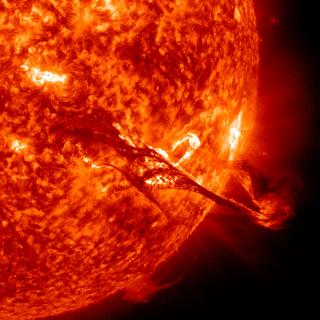Bibcode
Sainz Dalda, A.; Bellot Rubio, L. R.
Referencia bibliográfica
Astronomy and Astrophysics, Volume 481, Issue 1, 2008, pp.L21-L24
Fecha de publicación:
4
2008
Revista
Número de citas
59
Número de citas referidas
45
Descripción
Aims:We investigate the spatial distribution of magnetic polarities in
the penumbra of a spot observed very close to disk center. Methods: High angular and temporal resolution magnetograms taken with
the Narrowband Filter Imager aboard Hinode are used in this study. They
provide continuous and stable measurements in the photospheric Fe I
630.25 line for long periods of time. Results: Our observations
show small-scale, elongated, bipolar magnetic structures that appear in
the mid penumbra and move radially outward. They occur in between the
more vertical fields of the penumbra, and can be associated with the
horizontal fields that harbor the Evershed flow. Many of them cross the
outer penumbral boundary, becoming moving magnetic features in the
sunspot moat. We determine the properties of these structures, including
their sizes, proper motions, footpoint separation, and lifetimes. Conclusions: The bipolar patches can be interpreted as being produced
by sea-serpent field lines that originate in the mid penumbra and
eventually leave the spot in the form moving magnetic features. The
existence of such field lines has been inferred from Stokes inversions
of spectropolarimetric measurements at lower angular resolution, but
this is the first time they are imaged directly. Our observations add
another piece of evidence in favor of the uncombed structure of
penumbral magnetic fields.
A movie is only available in electronic form at http://www.aanda.org
Proyectos relacionados

Magnestismo Solar y Estelar
Los campos magnéticos son uno de los ingredientes fundamentales en la formación de estrellas y su evolución. En el nacimiento de una estrella, los campos magnéticos llegan a frenar su rotación durante el colapso de la nube molecular, y en el fin de la vida de una estrella, el magnetismo puede ser clave en la forma en la que se pierden las capas
Carlos Cristo
Quintero Noda